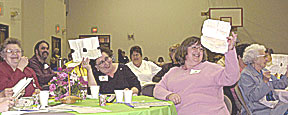
A smiling audience holds up papers they folded differently from the same instructions given them. The exercise was part of a talk given by Kim Allen at a recent parenting conference.
The audience was attentive when lawyer, Belinda Elliston of Webb City and Lamar, talked about parental rights and the role of a child advocate, also known as a guardian ad litem. They were enlightened by the paper folding exercise by Kim Allen, a human development specialist, showing that even the listening skills of adults need honing. But to top off the morning they heard from Shannon Wendt of LifeChoices and Del Camp and Donna Copeland of Ozark Center on how different the world is from the days of Elvis and rock 'n roll and their own youthful times, and how today's culture affects their children.
Legal issues, positive discipline and dealing with peer pressure were a few of the topics discussed at Parenting--The Second Time Around, a conference for grandparents and other relatives raising children. Sponsored by the Area Agency on Aging, the Southwest Missouri Community Alliance and the University Outreach and Extension, the day-long conference, held at St. Paul's Methodist Church in Joplin on April 8, was designed to provide "kinship caregivers" with information and tips for coping with the challenges they face.
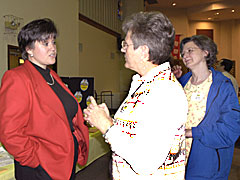
After her short talk on child advocacy issues, Belinda Elliston,a lawyer, answers questions. Elliston had advised the audience to make sure that they understood all the ramifications in seeking custody of their grandchildren.
Herself a children's advocate, Elliston advised the audience pursuing guardianship to get to know the worker assigned to the case from the Department of Family Services and be appraised of all the issues that mandate a termination of parental rights.
"If your housekeeping is not up to snuff," Elliston said, "that does not mean that your home is not appropriate." In looking at the appropriateness for the child to be there--for safety and proper hygiene, Elliston implied that a guardian ad litem, chosen by the court to represent the interests of the child, was a reasonable person.
Change your psychology
Learning a new term, "to teach," rather than "to punish," Allen said, parents would build a better relationship with their child. Quoting the work of Rudolf Dreikurs, Allen stressed 3 C's. The child should feel connected, capable, and know that he or she is contributing to the family. A parent should use words like, "good job," and give lots of non-verbal hugs, pats, and winks, Allen added.
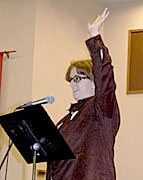
Kim Allen, Regional University Extension Human Development Specialist, asks the audience to hold up their hands if they had completed their questionnaires. She noted that while listing three positive qualities about their children took three minutes, coming up with three negative qualities only took a minute and a half. She warned the audience about having too high expectations, and that noticing positive things about their children will help change their negative behaviors.
Allen described abused children as wanting to misbehave to gain attention and control. When they are not feeling loved, Allen said, they say hurtful things and seek revenge. A power struggle with such a child makes a parent feel hopeless, she added.
In outlining what to do with a misbehaving child, Allen listed setting boundaries and limits and using natural and logical consequences that are firm and friendly but allow choice. Communication should include I-statements: when you...I feel...because I would like. "When you throw your toys at me, I feel very frustrated... I feel great because you cleaned your room without asking"... were two examples Allen gave.
How to reach the Millenials
When the Generation X ended with those born between 1961-81, the Millenial Generation began for those children in sixth grade through college. With possibly two generations in between them, grandparents face a tremendous challenge of relating to children greatly influenced by peer pressure and media violence. But it makes no difference which age group you claim. The speakers all agreed that teaching family values is important to all of them.
Copeland, who said she was a grandmother herself, defined the influences that impact children's lives. She called attention to the violence on TV, in the movies, or in playing video games like Mortal Combat. "They play hour after hour. Is that a good idea," she asked?
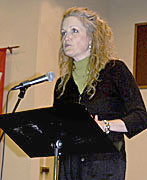
Humorously referring to herself as The Sex Lady, Shannon Wendt tells the audience how to deal with teenage topics. She believes that they should "talk to their kids early and talk to them often."
In discussing teenage pregnancy, Wendt called attention to a 17% drop in rate in Jasper County that she attributed to a better understanding of the inadequacy of contraceptive use and the movement to limit sexual activity before marriage. On the topic of birth control, Wendt called young women "sweet, precious idiots."
Wendt recommended to the grandparents to research topics of abortion, homosexuality or contraceptives and select books that the children could read that fit their family values. "Talk to them early, talk to them often" was her advice, adding that "kids need to be told that what they see on TV is not reality."
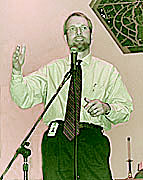
Drugs give abused kids a sense of empowerment, according to Del Camp, who said that parents can guarantee that "at a party here someone also would have meth in his pocket."
Camp, who is responsible for assessments of chemical dependency at Ozark Center, defined the top three classes of drugs as the ones that make the user "fast," "slow," or just plain "crazy." This includes speed and meth, alcohol and barbiturates, and hallucinogens.
"The top three drugs in this area," he said, "are nicotine, alcohol and marijuana-- 40 times more potent than in the 60's." He described the red flags that indicate drug use as a change in: affect/attitude--a shift of energy level; behavior--coming home later or changing the family rules; and culture--seeing their child's choice of friends going downhill or their choice of dress changing.
"Scaring kids about drugs doesn't work," Camp said. "Talk to them about what is real--what is realistic. Your relationship that you've built determines whether your child chooses drugs."
For those who missed this conference, free workshops will be offered from 9:00 a.m. to 11:00 a.m. on April 22 and 29, and May 6 and 13 at the Southwest Missouri Community Alliance, 3230 S. Wisconsin, Joplin. See our calendar for more details, or contact Jinny Hopp, human development specialist, Jasper County University of Missouri Outreach and Extension.






Comments